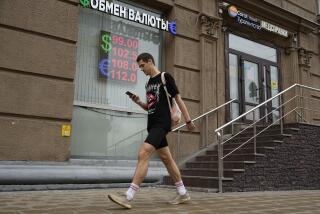Israel Devalues Shekel to Curb Speculation
- Share via
JERUSALEM — The Israeli shekel was devalued 5% Tuesday to stem a speculative buying binge of foreign currencies. Analysts said it indicated that the new government will move quickly to deal with the foundering economy.
The Bank of Israel announced the devaluation after consultations with Finance Minister Shimon Peres. Peres, the former foreign minister, moved into the finance post when the new government was installed last Thursday.
The new exchange rate is 1.680 shekels to the dollar, compared to 1.599 before the devaluation, the central bank said.
The move prompted the stock exchange in Tel Aviv to close an hour early “to allow time for adjustment,” said Yossi Nitzani, the general director. He said the market would open on schedule today.
The devaluation was the first since a 10% adjustment in January, 1987, and was less than industry and commerce leaders had lobbied for. That led some analysts to predict further devaluations.
Forced to Act
Factory production has been declining for a year, and economists say the main reason is that profits have been squeezed by rising production costs and a fixed exchange rate for earnings abroad.
Israel’s economy is expected to grow only 1% this year, a sharp drop from the 5.2% growth in 1987.
Most of the weakness has been blamed on an industrial slowdown and on the effects of the year-old Palestinian uprising in the occupied territories.
The government apparently was forced to move Tuesday because of soaring currency speculation sparked by rumors of an imminent devaluation of as much as 15%.
“What happened this morning was extraordinary,” Bank of Israel chief Michael Bruno said on Israel radio. “There was a real danger that in several days monetary reserves would drop below the $3-billion mark.”
Gideon Schurr, spokesman for the Bank of Israel, said purchases in foreign currency were “particularly high” Tuesday, but he refused to give exact figures.
Israeli army radio said Israelis purchased a record $80 million in U.S. dollars and other foreign currencies before the devaluation was announced.
The public apparently hoped to make a profit by buying foreign currency at a lower shekel rate and selling after devaluation at a higher rate.
Analysts said it was too early to tell if the devaluation will stem the speculation.
May Spark Inflation
Yacov Sheinin, manager of the Economic Models Ltd. forecasting firm in Tel Aviv, suggested that there might be another 5% devaluation early in January and a similar devaluation later in the month, “making it less profitable to go to dollars and then shift back to shekels” because of bank service charges averaging 3% on the transactions.
But Sheinin said devaluation could spark inflation and might not help the economy unless coupled with budget cuts and an agreement to hold down wages.
The government is expected to show a deficit of more than 1 billion shekels, or $600 million, this year, largely because of increased defense spending to handle the Palestinian uprising.
The devaluation drew criticism from the right-wing Likud bloc and from some in Peres’ Labor Party.
Peres’ predecessor in the finance ministry, Moshe Nissim of Likud, said he resisted pressure to devalue “because I was not prepared to listen to the dictate of the street.”
Chaim Ramon, a Labor member of parliament, termed the action “a worthless step” and said it would have been better to wait and come out with a general economic program.
But Peres’ economic adviser, Amnon Neubach, said the move was necessary to calm the public and the markets.
More to Read
Sign up for Essential California
The most important California stories and recommendations in your inbox every morning.
You may occasionally receive promotional content from the Los Angeles Times.












